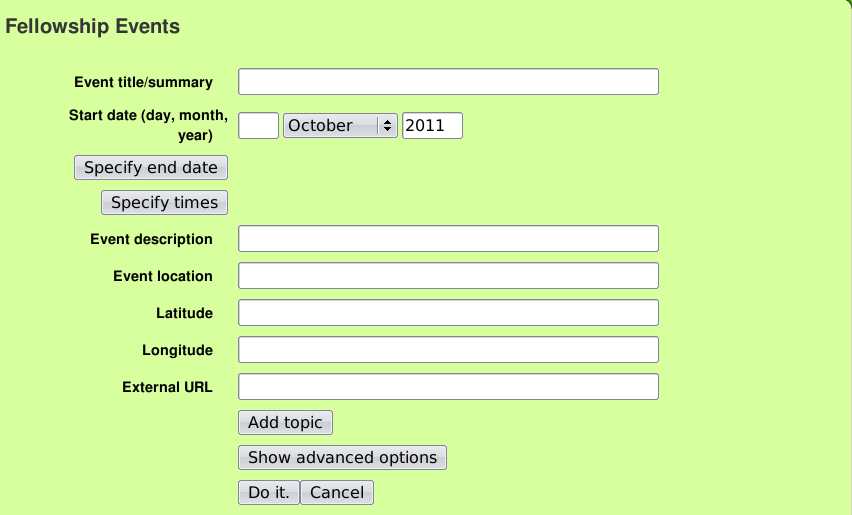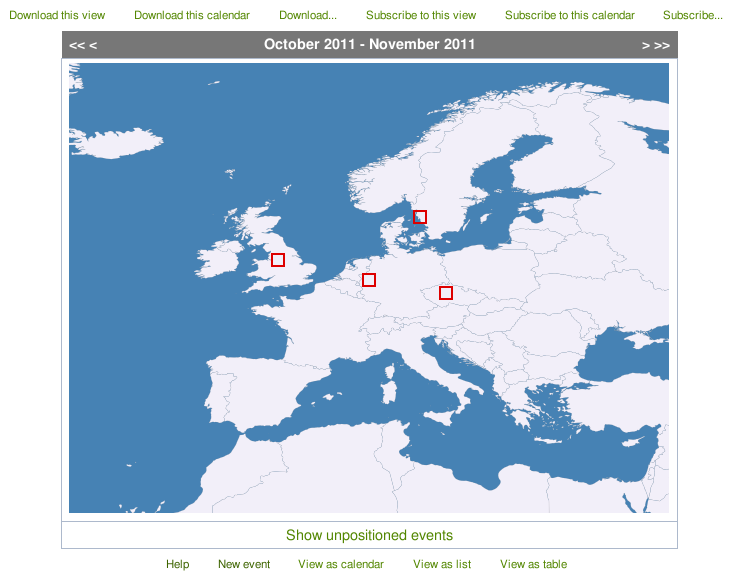Paul Boddie's Free Software-related blog
Paul's activities and perspectives around Free Software
The FSFE Fellowship Events Calendar and GriCal
Some time ago, I got involved with the FSFE Fellowship Wiki and implemented the theme code for MoinMoin that blends the Wiki together with the visual styling for the different Fellowship Web sites, along with an event calendar that shows what different Fellowship groups and individuals are doing – an activity which led to the release of the EventAggregator extension for MoinMoin.
Back then, a simple solution which let people add events by adding event pages to the Wiki, perhaps using the new event form, was sufficient and it seems that people did manage to publish their events after all. Having a solution already integrated with the Wiki was arguably preferable to installing yet more software and then thinking about theming and integration all over again, and nothing from the range of existing solutions – at least those known to the Wiki team – appeared to be particularly compelling. So, a bit of Wiki extension work got the job more or less done.
But now, some interesting work has become visible in the form of GriCal: a Free Software events service that not only carries details of numerous events related to Free Software, but is also a genuinely free solution whose code can be downloaded and deployed for those sufficiently motivated to do so. Some people prefer to publish events on GriCal and would rather see them appear automatically in the Fellowship events calendar. So why not aggregate events not only from the content on the Wiki but also from other sites?
EventAggregator has virtually always supported the iCalendar format as a way of downloading calendars, so that it is possible to view the Fellowship events calendar using your own calendar or organiser client, but could it not also support iCalendar as an input format? From the beginning, EventAggregator has used the fundamental information reminiscent of iCalendar to define events, albeit without all the BEGIN:VEVENT and DTSTART syntax, so surely a few adjustments were all that were necessary. Well, it did require a bit more work than that, necessitating some refactoring and the revisiting of assumptions that tends to happen when software evolves to do a bit more than it was originally intended to do, but now the distinction between events from remote sources and local pages is more and more blurred: the calendar doesn’t care where the events come from, although some caching within MoinMoin does attempt to stop those sites acting as event sources from being worried about having their events downloaded a bit too often.
So what does this mean for Wiki users? Well, defining calendars and creating events is still as straightforward as it used to be, especially if you use the “New event” link either below each calendar or in the menu when hovering over a day number in the calendar view. But if you know of some useful sources of high quality event information, you can also add an event source to the Wiki’s register of sources and then use those sources when showing your calendar.
Apart from all this new support for iCalendar aggregation, EventAggregator has also gained support for some other nice features over the past year or so. You can now view days individually and see the time information for events, and this can be useful when looking at things like conference schedules where lots of individually scheduled events are occurring within a short time-frame. You can also view events in any suitably prepared map, with events shown on a European map being perhaps the most obvious application for this feature in the Fellowship Wiki. Although the default map is not as fancy as something like OpenStreetMap or its proprietary competitors, the simple layering of active regions over a bitmap could be useful for customised maps, perhaps even things like building plans or anything that takes liberties with the concepts of latitude and longitude!
So I hope I’ve inspired you to at least take a look at the Fellowship events calendar. Remember that the Wiki is a collaborative resource: it doesn’t improve all by itself with only its increasing age to help it along. But with a bit of interest and even the most modest contributions, it has the potential to become a powerful tool and a medium to create greater and better things.
Finally, I’d like to thank Wolfgang for encouraging me to look into integrating EventAggregator with GriCal, opening up lots of new possibilities, and Ivan for telling me about GriCal and working hard to make the service work well with those of us who want to use its iCalendar output. I’d like to think that through such mutual encouragement and help, Free Software projects, products and services can only get better and better. The experience has certainly been a satisfying one for me, and I hope that Wiki users can now share in some of the benefits of this rewarding work.


